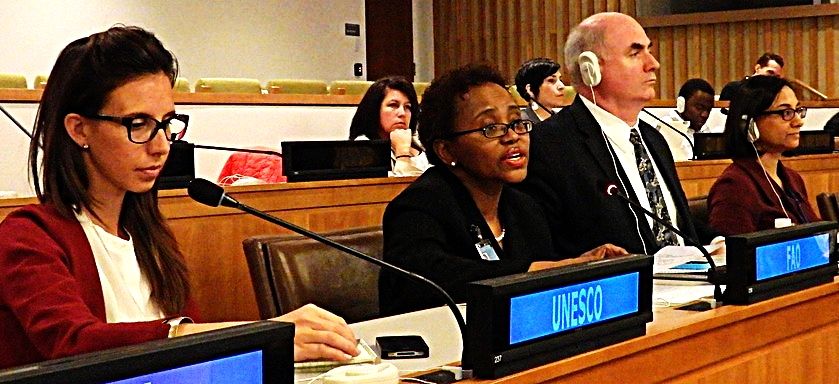Rights of Indigenous Peoples, General Assembly's 3rd Committee
21/10/2013

Ladies and Gentlemen,
Worldwide, 2.5 billion people derive their livelihoods from agricultural resources; 900 million poor people live in rural areas and 720 million -- of whom 400 million are indigenous peoples – directly depend on agriculture and related activities.
FAO considers indigenous and tribal peoples, with their wealth of ancestral knowledge, key partners in the fight against hunger, malnutrition and food insecurity.
Through their on-farm/in situ conservation and management of resources, farmers, pastoralists/ herders, fishers, foresters, foragers, gatherers, mountain people and other communities following traditional lifestyles actively maintain high levels of biological diversity including genetic resources for food and agriculture. These practices and knowledge create an important basis for the food security of present and future generations worldwide.
In April this year, after an extensive consultation process, member states adopted FAO’s new Corporate Strategy for Partnerships with Civil Society Organizations. This renewed Strategy reflects the need for partnerships and multi-stakeholder approaches in all areas of FAO’s work, and at all levels.
The renewed Strategy not only identifies indigenous peoples as vulnerable and marginalized communities needing support, but it also recognizes the unique contribution of their agri-food systems and the traditional knowledge that supports them, making explicit reference to FAO’s Policy on Indigenous and Tribal Peoples.
Particular focus is put on strengthening FAO’s work at the decentralized level through its Country Programming Frameworks. It is in these frameworks where national priorities in food security are identified.
FAO will intensify its efforts to make sure that indigenous peoples’ organizations, along with other stakeholders, will be meaningfully involved in the Country Programming Frameworks.
The approval in May 2012 of the Voluntary Guidelines on the Responsible Governance of Tenure of Land, Fisheries, and Forests in the context of National Food Security - the result of a thorough negotiation process in which representatives of Indigenous Peoples participated actively - , is also a good sign of the efforts undertaken to protect indigenous peoples’ rights and customary tenure systems.
These Voluntary Guidelines do not only recognize the economic and environmental value, but also the social, cultural and spiritual value that land, fisheries and forests have for indigenous peoples.
It is important for countries to consider the elaboration of specific policies and strategies that address indigenous peoples within their country development plans and objectives. The recognition of indigenous peoples’ territories and land rights is needed, along with an integrated approach to increase their access to capital, physical and social assets, and provide them with the possibilities to exit from their socioeconomic vulnerable situation.
The International Year of Family Farming will take place in 2014, and it will be launched here at the UN, 22 November. Some 370 million family farms belong to indigenous communities. For Family Farming to be inclusive and respectful of the needs of the vulnerable, it needs to address issues such as:
– Common resources tenure and management
– Traditions and values
Indigenous Peoples engagement and inputs are fundamental for FAO in this vision
FAO looks forward to working closely with all to promote new, inclusive and pluralistic ways of food production, distribution and consumption, in which indigenous peoples and their invaluable knowledge must be at the frontline. Only with the active collaboration of indigenous peoples can we achieve food production systems capable of ensuring the sustainable future of our mother earth, its Beings and the many peoples and cultures to which it is home.
Thank you.
